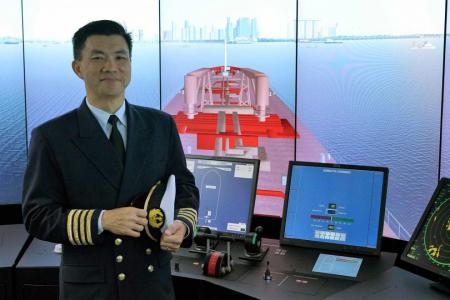Polytechnic lecturer juggles many roles
Captain Cheong Kwee Thiam draws upon his years of experience to make lessons for his students more interesting
Captain Cheong Kwee Thiam’s extensive exposure to the shipping industry is a valuable asset in his job as a lecturer at Singapore Polytechnic’s (SP) Singapore Maritime Academy (SMA).
He has worked on board a ship in roles ranging from deck cadet officer to Master Mariner (Captain) in a 16-year career with Neptune Shipmanagement Services. He then amassed considerable onshore experience in various positions, which include stints as a marine superintendent & manager and company security officer.
But in 2011, he made a decision to take up teaching at SMA instead.
“Whether at sea or ashore, I find joy in doing research and sharing my knowledge with junior colleagues and trainees. I realise that teaching in a polytechnic will give me an early start in ‘shaping the future’ of my students by planting good seeds early,” he says.
“I feel SP is the appropriate place to fulfil my dream and also for those who aspire to excel in the maritime industry,” says Captain Cheong, who has an academic background in maritime law and arbitration.
Leading by example through volunteering efforts
Captain Cheong is very active in volunteering. He is enthusiastic about police-related work and has a passion for enforcing law and order. Volunteering served as an avenue to tap that interest.
For about five years, he served as a Volunteer Special Constabulary (VSC) with the Singapore Police Force at the Clementi Land Division, at least 16 hours per month.
For about a year now, he has been volunteering as a Police Coast Guard, intercepting suspects on the waters and conducting training for marine police courses such as navigation and seamanship for VSC coast guards.
He says: “Volunteers have the responsibility to spread good values to people in the community. I hope to inculcate good values in my family members and students through my involvement in such activities.”
“If it inspires them to start volunteering too, all the better,” he says with a laugh.
He usually does his Police Coast Guard duties on weekends and public holidays, amassing at least 16 hours of service monthly. He juggles volunteering commitments with teaching by planning his schedule at least one to two months in advance.
He says that these volunteering activities made him more empathetic and patient. This disposition helps him to better empathise with, related to and connect with students.
Melding Teaching with Life Experiences and Volunteerism
These rich life and volunteering experiences have also made Captain Cheong’s lessons more interesting.
His maritime-related background helps him blend real-life experiences with theoretical insights for his students in the forms of literature, tutorial exercises and even examination questions.
Students appreciate that they are learning from a knowledgeable lecturer who is well-versed in maritime-related issues.
Captain Cheong says: “My students not only comprehend theories, but also rationales behind additional theories that may be missing in textbooks.”
During lesson time, when the relevant topic arises, Captain Cheong relates to his students mediation skills required to resolve community disputes during his tour of duty in the VSC.
“I had had my fair share of mediating disputes at sea or ashore throughout the years. Mediation as an alternative for dispute resolution (ADR) is a topic covered in one of the modules I teach. So my VSC experience comes in handy,” he says.
He recounted an experience when he was approached by the father of an ex-student, telling him how his son “kept sharing the life and volunteering experiences that I incorporated into my classes with the family and how the son found them interesting and useful for his understanding of the topics he is studying”.
Captain Cheong’s desire to share his knowledge even led him to become an author. When he found some existing books too technical for new entrants to shipping, he was driven to produce a simpler book.
The textbook he wrote — Introduction to Shipping — is used in SP. The first edition was published in 2012 and the second edition in 2016.
He says: “I put myself in the readers’ shoes and constantly ask myself if they understand what I wrote? Are they able to apply the literature in practice? Is the book useful to the industry?”
Captain Cheong welcomes constructive criticism. “I am always thankful to those who critiqued it, as life is about continuous improvement,” he says.
Get The New Paper on your phone with the free TNP app. Download from the Apple App Store or Google Play Store now


